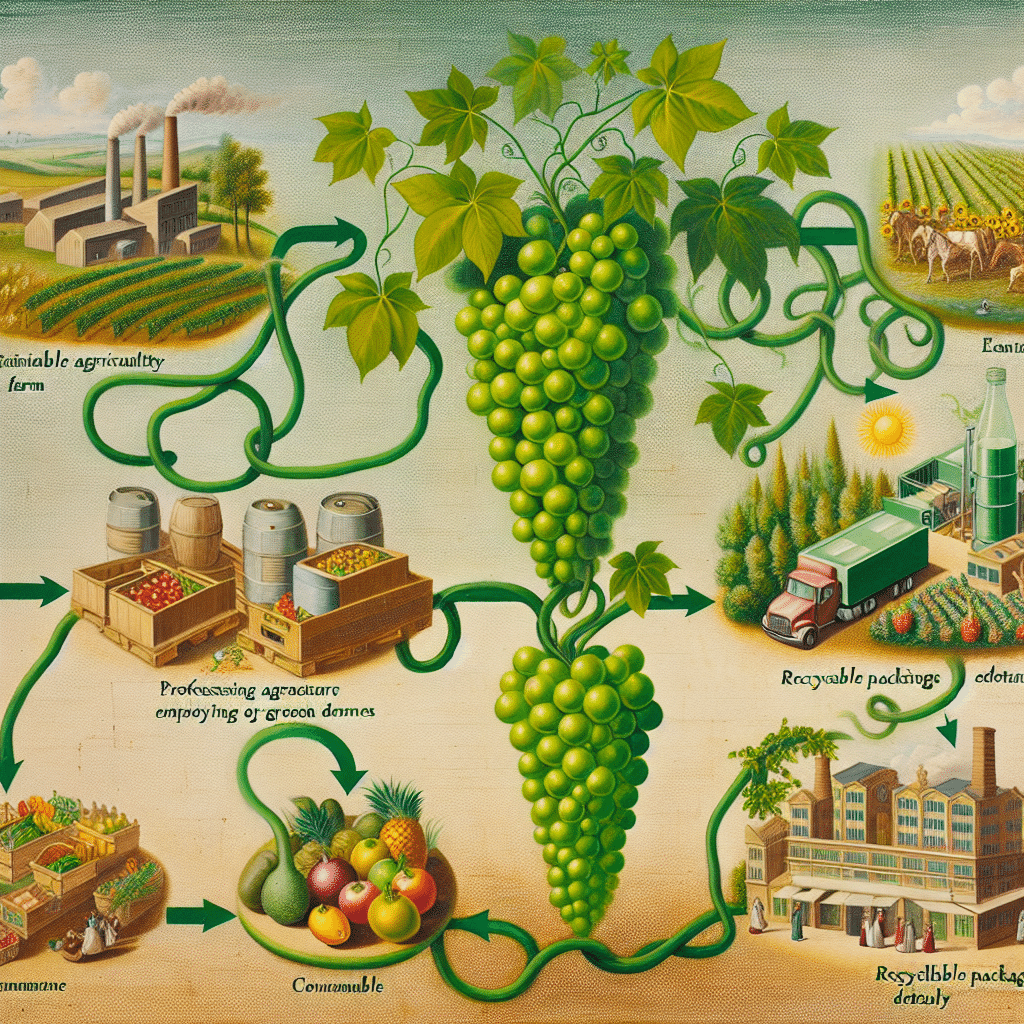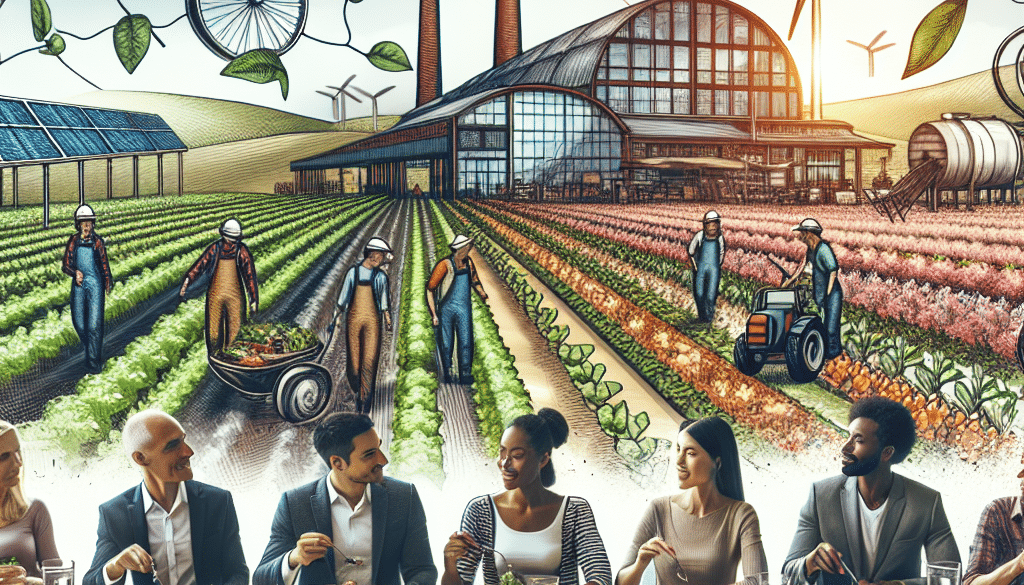Growing Sustainability Across the Food and Beverage Industry
-
Table of Contents
- Sustainable Growth in the Food and Beverage Industry
- The Imperative for Sustainability
- Innovative Approaches to Sustainable Production
- Case Studies of Sustainable Practices
- Reducing Food Waste Through Technology
- Consumer-Driven Change
- Regulatory Influence and Industry Standards
- Conclusion: The Future of Sustainable Food and Beverage
- ETChem’s Contribution to Sustainable Protein Solutions
Sustainable Growth in the Food and Beverage Industry

The food and beverage industry is at a critical juncture where sustainability is no longer a choice but a necessity. With the global population projected to reach 9.7 billion by 2050, the demand for food and beverages is set to increase significantly. This growth comes with a responsibility to address environmental concerns, ethical sourcing, waste reduction, and energy efficiency. In this article, we will explore the various strategies and innovations that are driving sustainability across the food and beverage sector.
The Imperative for Sustainability
Sustainability in the food and beverage industry encompasses a range of practices aimed at reducing the environmental impact of production, ensuring fair labor practices, and providing healthy and safe products to consumers. The urgency for these measures is underscored by the following factors:
- Climate change and its impact on agriculture and food supply chains.
- Depletion of natural resources due to overexploitation.
- Consumer demand for transparency and ethically produced goods.
- Regulatory pressures to reduce carbon footprints and waste.
Innovative Approaches to Sustainable Production
Companies within the food and beverage industry are adopting innovative approaches to minimize their environmental footprint. These include:
- Implementing renewable energy sources in production facilities.
- Utilizing precision agriculture techniques to optimize resource use.
- Developing plant-based and lab-grown alternatives to reduce reliance on animal agriculture.
- Investing in sustainable packaging solutions to reduce plastic waste.
Case Studies of Sustainable Practices
Several companies stand out for their commitment to sustainability:
- Unilever has pledged to halve its use of virgin plastic by 2025 and to collect and process more plastic packaging than it sells.
- PepsiCo is working towards sourcing 100% renewable electricity globally and has introduced biodegradable packaging for its snack products.
- Impossible Foods and Beyond Meat have revolutionized the industry with their plant-based meat products, significantly reducing the environmental impact compared to traditional meat production.
Reducing Food Waste Through Technology
Food waste is a significant issue, with approximately one-third of all food produced globally going to waste. Innovative technologies are being employed to tackle this problem:
- Mobile apps that connect consumers with discounted food items that are close to their expiration date.
- Advanced packaging that extends the shelf life of perishable goods.
- Supply chain optimization software that predicts demand more accurately to prevent overproduction.
Consumer-Driven Change
Consumers are increasingly aware of the environmental and social impact of their purchases. This awareness is driving change in the industry as consumers seek out products that align with their values:
- Demand for organic and locally sourced products is on the rise.
- There is a growing trend towards vegetarianism and veganism, with consumers looking for plant-based alternatives.
- Eco-labels and certifications, such as Fair Trade and Rainforest Alliance, are becoming more influential in purchasing decisions.
Regulatory Influence and Industry Standards
Governments and international bodies are also playing a role in promoting sustainability through regulations and standards:
- Carbon taxes and emissions trading schemes incentivize companies to reduce their greenhouse gas emissions.
- Regulations on single-use plastics are leading to increased use of sustainable packaging materials.
- Industry standards, such as the Global Food Safety Initiative (GFSI), include sustainability criteria in their certification processes.
Conclusion: The Future of Sustainable Food and Beverage
The food and beverage industry is undergoing a transformation as it embraces sustainability. Through innovative production methods, waste reduction technologies, consumer-driven demand, and regulatory frameworks, the industry is making strides towards a more sustainable future. The key takeaways for businesses in this sector are to invest in sustainable practices, listen to consumer demands, and stay ahead of regulatory changes to ensure long-term success and a positive impact on the planet.
ETChem’s Contribution to Sustainable Protein Solutions
As the food and beverage industry continues to grow sustainably, protein products play a crucial role in meeting the nutritional needs of the global population. ETChem is at the forefront of providing high-quality, sustainable protein solutions. Their range of collagen products, including marine, fish, bovine, and chicken collagen, are produced with sustainability in mind. These products offer a neutral taste and instant solubility, making them ideal for various applications in the food and beverage industry.
ETChem’s commitment to sustainability is evident in their production processes and their dedication to serving a wide array of industries with eco-friendly protein options. By choosing ETChem’s collagen products, companies can ensure they are incorporating sustainable protein ingredients into their offerings, aligning with consumer expectations and contributing to a more sustainable food system.
About ETChem:
ETChem, a reputable Chinese Collagen factory manufacturer and supplier, is renowned for producing, stocking, exporting, and delivering the highest quality collagens. They include marine collagen, fish collagen, bovine collagen, chicken collagen, type I collagen, type II collagen and type III collagen etc. Their offerings, characterized by a neutral taste, instant solubility attributes, cater to a diverse range of industries. They serve nutraceutical, pharmaceutical, cosmeceutical, veterinary, as well as food and beverage finished product distributors, traders, and manufacturers across Europe, USA, Canada, Australia, Thailand, Japan, Korea, Brazil, and Chile, among others.
ETChem specialization includes exporting and delivering tailor-made collagen powder and finished collagen nutritional supplements. Their extensive product range covers sectors like Food and Beverage, Sports Nutrition, Weight Management, Dietary Supplements, Health and Wellness Products, ensuring comprehensive solutions to meet all your protein needs.
As a trusted company by leading global food and beverage brands and Fortune 500 companies, ETChem reinforces China’s reputation in the global arena. For more information or to sample their products, please contact them and email karen(at)et-chem.com today.




